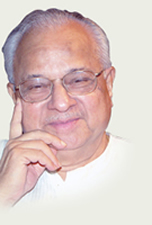Concluding remarks
One thing that comes to one attention is that whichever a people belonging to whichever place and whichever period, there is a strange foundational conformity in their experiences and perceptions, though they seem to have been expressed in diverse fashion according to the society, the place and period in which they lived. No seer is superior to any other, whether oriental or occidental, whether ancient or recent, experiencing the luminous moments in absolute purity, finding no need to extend except for the limited purpose to share it with others, through terms and figures, words and symbols that vary when the original experience is expressed. If comparative philosophy is accepted as a religion, then there will remain no scope for dogmatic beliefs and faiths, sects and factions. There would then be no prophets nor protagonists, holy scripture or texts not dividing but cementing the differences.
The seers of all the places and periods have declared without hesitation that apart from the Primal Existence, apart from That One nothing else exists as the eternal, universal neither being crafted by intellect nor fashioned by mind, but as an experience perceived with full receptivity as something beyond mind and speech and breath, these three being the prime instruments which That One created for bring creativity in existence. Therefore, in enlightenment both ![]() experienced perception and
experienced perception and ![]() being experienced reception becomes important,
being experienced reception becomes important, ![]() being combination of
being combination of ![]() and
and ![]() or
or ![]() of the luminous light within and
of the luminous light within and ![]() being the consummation of the enlightened awareness.
being the consummation of the enlightened awareness.
Even as every thing that was created, from the greatest of the great to the smallest of the small, every un-manifest element and every un-manifest emotion becomes palpable using Mind, Speech and Prana, through perception, reception, reflection and meditation, though not in similar extensive and intensive reach which Brahman had. Therefore, if the figures, words, symbols and language used for conveying the subtle and profound mystical experiences by some do not have the same grace, richness and beauty of the experience, appearing prosaic, pedantic and practical, then the fault lies not in the experiences but in the inability of the attributes and inclination, temperament and personality of the communicator.
In each of them, awareness did not seep as a stream would through crevices of the hardened boulders, but flashing like lightening and reverberating like thunder, with all uncertainty removed and all doubts resolved. Enlightenment is the ripe fruit, neither racial nor regional, not plucked by a gardener at will but which fell involuntarily effortlessly. So it was with Valya, the hunter who became Valmiki, so it was with Siddhartha, the prince who became Buddha, as it was also with Tulasidas, the poet, with Gadhadhra, who became Paramahamsa, or with Venkataraman who became Ramana Maharshi. For Socrates it came as voice, ‘which always forbid but never commnded’ the dream ‘coming to me from time to time and always saying thwe same thing’. ‘Tao’s principle is spontaneity’ or as Haiku poet says ‘Poppy petals fall softly, quietly, calmly when they are ready’ or ‘Gazing at falling petals, a baby almost looks like a Buddha’, so was it when Gabriel told Muhammad ‘Read’.
A comparative study of the thoughts expressed earlier or expressed in recent times, in the east or in the west, makes one conscious that savants of every period and place, while expressing in diverse manners show a common strand of eternal essence not constrained by people, place or the period, validating the immortal words that ![]() the Prime Existence is singular and unitary experience though fashioned variously -
the Prime Existence is singular and unitary experience though fashioned variously - ![]()
BACK

